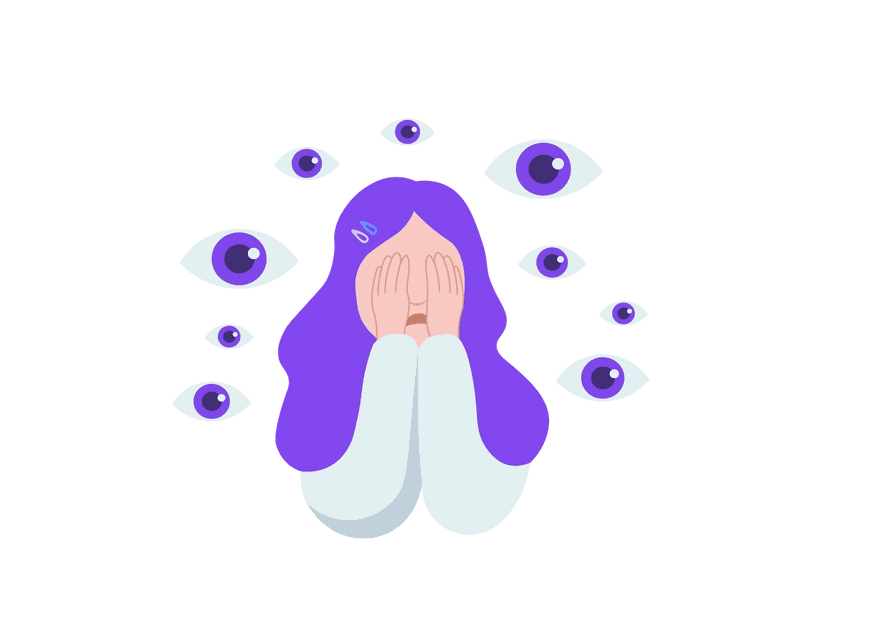Social anxiety is a disorder of the mind that affects many people in their everyday lives. There are different types of social anxiety, some more severe than others. The signs and symptoms can be difficult to manage but there are treatment options available for those who suffer from this disorder. This article will explore what social anxiety is, how it’s caused, and how you can overcome it!
Contents
Understanding Social Anxiety Disorder Or Social Phobia
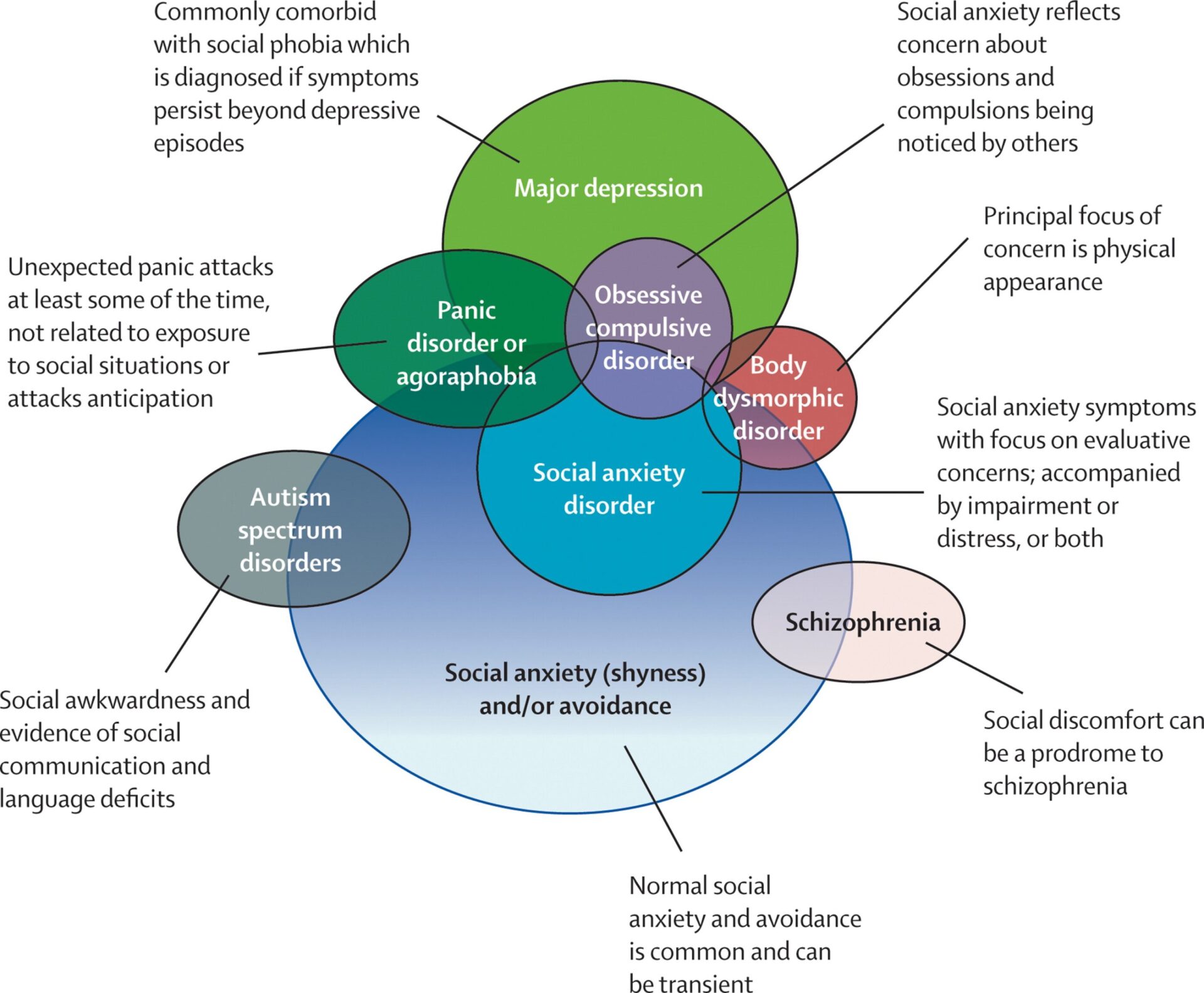
Social anxiety disorder is a mental illness that causes intense fear in social situations. People with this disorder may feel very anxious and uncomfortable in any type of social situation, such as meeting new people, speaking in front of a group, or eating in public.
Social Anxiety disorder In Children
If a child has a parent with an attachment-based form of social phobia, they may grow up to develop this type themselves. The child can present symptoms as young as three years old and anywhere through their teenage years. Symptoms include:
- Oversensitivity to criticism
- Excessive shyness and introversion
- Withdrawing from social situations or activities they usually enjoy
- Having a hard time making friends
- Anxiety about being judged by others
Causes of Social Anxiety
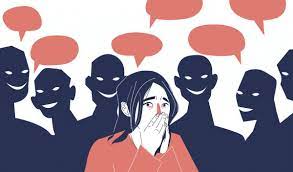
There is no one definitive answer to this question but there are several factors that may contribute to the development of this disorder. Some possible causes include:
Genetics: Social anxiety may be passed down from parents to their children.
Chemicals in the Brain: People with this disorder may have an imbalance of certain chemicals in their brain which can lead to anxiety.
Environmental Factors: If a person is constantly exposed to social stress, they may develop anxiety.
Degrees of Social Anxiety Disorder
There are different degrees of social anxiety disorder, each with its own set of symptoms.
Mild: This is when a person has some mild fears in certain situations that can be overcome through self-help techniques or therapy sessions.
Moderate: A moderate form of social anxiety may interfere more severely with daily activities and relationships than the previous degree.
Severe: A severe form of social anxiety can be debilitating and may cause a person to avoid many social situations altogether.
Types of Social Anxiety Disorder
There are several different types of this disorder that people can have which will affect their lives differently. These include:
Generalized Social Phobia or GSAD
This type of social phobia causes the sufferer to be anxious in most social situations.
Specific Social Phobia or SAD
This type of social anxiety disorder only affects the sufferer in certain types of social interactions.
For example, someone with a Specific Social Anxiety Disorder may experience severe anxiety when speaking on the telephone but not face to face. There are several different kinds of specific social phobias which include:
- Performance Anxiety Disorder or PAD
- This type of disorder affects people who have to perform in front of others, such as public speakers, actors, and musicians.
- Public Speaking Anxiety Disorder or PSPAD
- This type of disorder only affects people when they are speaking in front of a group.
- Social Interaction Anxiety Disorder or SIA
- This type of disorder only affects people when they are interacting with others. People with this disorder may feel anxious in group settings, romantic situations, and one-on-one interactions.
Signs And Symptoms of Social Anxiety Disorder
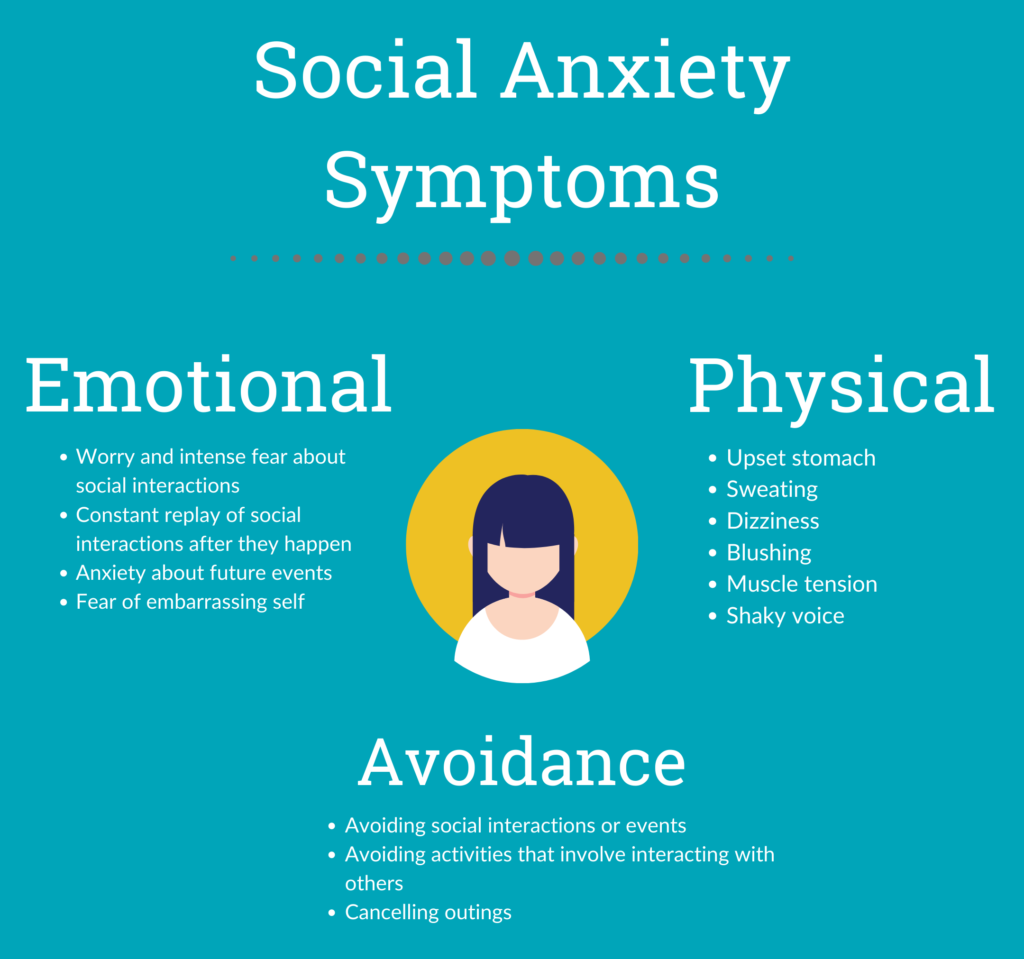
Emotional Signs And Symptoms
The emotional signs and symptoms of social anxiety will vary depending on the person. But there are some common emotions that people with this disorder may feel. These include:
- Frequent feelings of embarrassment
- Anxiety over making eye contact during conversations
- Feelings of nervousness when speaking in front of others or participating in group settings
- Not feeling comfortable introducing themselves to new people, even if they think the other person is friendly and wants to get to know them
- Worrying about how they will be perceived by others and what they will say or do wrong
Physical Signs And Symptoms
The physical signs and symptoms of this disorder can also vary from person to person but there are some common ones that people experience. These include:
- Racing heart
- Shortness of breath
- Dizziness and lightheadedness
- Tingling in the hands, legs, or feet
- Stomach cramps and nausea
- Sweating profusely (sweaty palms)
Behavioral Signs And Symptoms
There are also some common behavioral signs and symptoms that people with this disorder may exhibit. These include:
- Avoiding social situations whenever possible
- Staying quiet and withdrawn in social situations
- Not engaging in conversations or activities that they enjoy because they are afraid of being judged by others
- Preoccupation with thoughts of what could go wrong during a social situation
- Excessive worry about embarrassing themselves in some way
Its Ill-effects On Other Areas of Life
A social anxiety disorder can have a huge impact on the sufferer’s life in many different areas. These include:
Relationships with friends or family
People with this disorder may find it difficult to maintain relationships due to their fear of being judged or embarrassing themselves. They may also avoid social situations as much as possible.
Work or School Performance
People with this disorder may find it difficult to concentrate in school or at work due to their anxious thoughts and feelings. They may also feel like they are always under scrutiny by others which can lead to extreme self-consciousness.
Self-esteem and self-confidence
The overall quality of life, happiness, and satisfaction with life can also be affected by this disorder. People with this type of disorder may feel that they are not good enough or do not measure up to what everyone else is doing, even though those thoughts are usually incorrect.
NOTE: This will affect how the person behaves in different situations and particularly when dealing with other people. For example, someone who is low in self-esteem may not feel confident enough to start a conversation with someone they don’t know or make eye contact.
How common is SAD
Social anxiety disorder is one of the most common mental health disorders in the world. It affects around 15 million Americans, which is about seven percent of the population. It can occur at any age but is most common among adolescents and young adults.
Shyness Vs. SAD
Some people may feel shy in social situations, but this does not necessarily mean that they have a diagnosable form of social anxiety disorder. Shyness is just one sign of the emotional and behavioral signs and symptoms of this type of mental health condition. A person can struggle with feelings of shyness without having an actual diagnosis called SAD.
Overcoming Social Anxiety Disorder
There is no one-size-fits-all answer to this question, as the best way to overcome social anxiety disorder will vary from person to person. However, some tips that may help include:
Identify your triggers
Determine what your triggers are and work on exposure therapy to slowly desensitize yourself to them. This can be a long process, but it can be very effective in the long run.
Start going out
Start small by going to places or doing things that make you feel comfortable first, even if they are not the most exciting options available. This can help build confidence over time as you face your fears in less intimidating situations.
Cope better
- Practice deep breathing exercises or meditation before and during social situations to help calm your nerves.
- Make a list of things that make you feel happy and confident, and remind yourself of them when you are feeling overwhelmed by social anxiety.
NOTE: Overcoming social anxiety disorder may also involve working with a therapist or participating in an online support group. Speak with a health care professional about social anxiety disorder and how to best treat it.
Tips For Overcoming Social Anxiety Disorder For Children

Tips for overcoming social anxiety disorder in children are similar to those that adults can use.
Determine your triggers
Talk with a therapist or counselor about specific situations where you feel most anxious and what leads up to them happening. This can help give you an idea of how to handle future instances more calmly, as well as determine the root of your anxiety.
Start small and work up
Encourage your child to gradually face their fears by starting with less intimidating tasks or situations and slowly working their way up. This will help them build confidence over time as they learn that they are capable of handling more difficult challenges.
Incorporate coping tools
Teach your child deep breathing exercises or how to practice mindfulness when they are feeling overwhelmed. They can write down things that make them feel happy and confident, then have a list of these on hand in the future for moments where they need extra help keeping calm.
NOTE: It is also important to check with your child’s school about any rules surrounding social anxiety disorder that must be followed to ensure their safety and success.
Treatment Options For Treating Social Anxiety Disorder
There is no cure for the condition but there are options available that can help reduce symptoms and make it easier to cope with daily. There are several types of treatment options that can be used, including:
Cognitive Behavioral Therapy (CBT)
Cognitive Behavioral Therapy is one of the most common and effective treatments for social anxiety disorder. It involves changing the thoughts and behaviors that contribute to social anxiety.
Exposure Therapy
Exposure therapy is also a popular treatment option that can help people face their fears gradually and steadily. It involves gradually exposing yourself to the situations or objects that cause you to fear or anxiety.
Talk Therapy
Talk therapy is a form of counseling that can help you explore the thoughts and emotions that contribute to social anxiety disorder. It also helps you change the behaviors that may be increasing your symptoms.
Medication
There are also medications available that can help reduce the symptoms of social anxiety disorder. However, medication should only be used as part of a comprehensive treatment plan. Medication, such as antidepressants or anti-anxiety medications, may be recommended if other treatments do not seem to be helping.
- Antidepressants: Antidepressants are medications that are helpful to treat a variety of mental health conditions, including social anxiety disorder. They work by altering the levels of serotonin in the brain, which can help improve mood and reduce symptoms of anxiety.
- Anti-anxiety Medications: Anti-anxiety medications are medications that are helpful to treat anxiety disorders. They work by reducing the amount of anxiety that a person feels. They are often used in combination with other treatments, such as cognitive-behavioral therapy or exposure therapy.
Talking To a Professional
If you are struggling with social anxiety disorder, it is important to talk to a professional about it. A health care provider can help you determine if you have this disorder and can recommend the best treatment plan for you. They can also provide support and guidance throughout your treatment journey. With the right assistance, you can manage this disorder and you can learn how to live a full life despite it.
Expert Comments On Social Anxiety Disorder
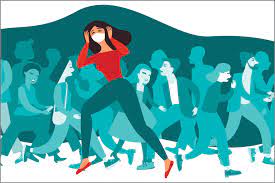
“Social anxiety disorder can be a very debilitating condition that significantly impacts a person’s quality of life. However, it is important to remember that there are treatment options available that can help reduce symptoms and make it easier to cope with daily.”
– Katherine Muller, PsyD
“Social anxiety disorder is one of the most common mental health conditions in the United States. It can be very debilitating and affect a person’s ability to participate in everyday activities. However, there are treatments available that can help reduce symptoms and make it easier to cope with.”
– Stephanie Sarkis, PhD
Case Study
Trevor is a 20-year-old male who was struggling with social anxiety. He reported that he had been feeling very nervous in most daily situations, including things like talking to coworkers or other people at parties and bars. Sometimes the symptoms would get so bad that he could not even leave his house for days. Trevor’s parents brought him in for a consultation and we determined that he met the criteria for social anxiety disorder.
We started Trevor on a course of Cognitive Behavioral Therapy, which involves changing the thoughts and behaviors that contribute to social anxiety. We also worked on exposure therapy, which involved gradually exposing himself to the situations or objects that cause him fear or anxiety. After a few sessions, Trevor started to feel more comfortable with his therapist and was able to face some of the social situations that used to cause him extreme anxiety.
We also worked on talk therapy, which involves exploring the thoughts and emotions that contribute to social anxiety disorder. This helps you change behaviors as well. We set up small goals for Trevor at first so that he could start to gain confidence in his ability to face the situations that used to make him anxious. We also discussed medications, which can help reduce symptoms and improve overall treatment outcomes.
End Result
About a year after we started therapy, Trevor was able to go out with friends again and even got a promotion at work! He credits much of his success in therapy and is very grateful for the help he received.
Conclusion
Social anxiety disorder is a common mental illness that can be debilitating for those who suffer from it. Fortunately, there are several ways to combat social anxiety disorder and learn how to overcome the symptoms associated with it. The most important thing you can do when trying to treat your social anxiety disorder is to find what works best for you and stick with it. And remember that you are not alone!
A Word From Therapy Mantra
Your mental health — Your psychological, emotional, and social well-being — has an impact on every aspect of your life. Positive mental health essentially allows you to effectively deal with life’s everyday challenges.
At TherapyMantra, we have a team of therapists who provide affordable online therapy to assist you with issues such as depression, anxiety, stress, workplace Issues, addiction, relationship, OCD, LGBTQ, and PTSD. You can book a free therapy or download our free Android or iOS app.
